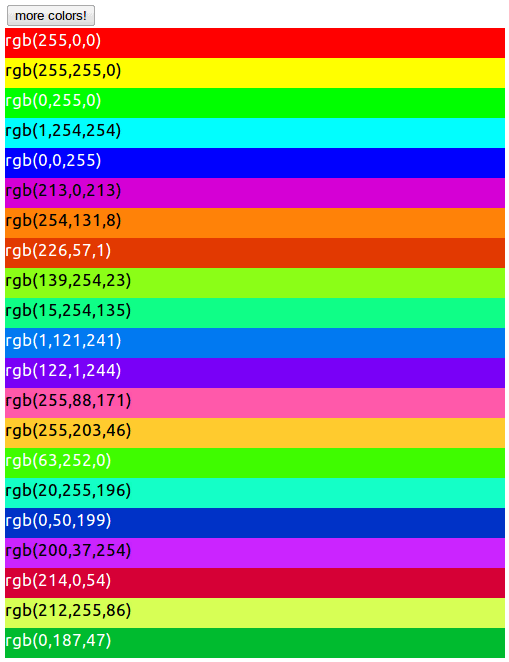At Browserling we are huge open-source fans and we have open-sourced 90 node.js modules! That's right! 90 node.js modules. All written from scratch. We're crazy!
Edit: Now we've open-sourced several hundred!
Here is the complete list of all the modules together with their brief descriptions. We have published all the modules on GitHub, which is the best tool for getting things done and collaborating. All of them are greatly documented so just click the ones you're interested in to read more and see examples.
We'd love if you followed us on GitHub. I am pkrumins on GitHub and James Halliday, co-founder of Browserling, is substack.
Also check out Browserling:
And read how we raised $55,000 seed funding for Browserling.
Here are all the modules we have written.
1. dnode

DNode is an asynchronous object-oriented RPC system for node.js that lets you call remote functions. Here is an example. You have your server.js:
var dnode = require('dnode');
var server = dnode({
zing : function (n, cb) { cb(n * 100) }
});
server.listen(5050);
This starts dnode server on port 5050 and exports the zing function that asynchronously multiplies number n by 100.
And you have your client.js:
var dnode = require('dnode');
dnode.connect(5050, function (remote) {
remote.zing(66, function (n) {
console.log('n = ' + n);
});
});
This connects to dnode server at port 5050, calls the zing method and passes it a callback function that then gets called from the server and the client outputs 6600.
We have built everything at Browserling using dnode, all our processes communicate via dnode. Also thousands of people in node.js community use dnode. It's the most awesome library ever written.
2. node-browserify
Node-browserify is browser-side require() for your node modules and npm packages. It automatically converts node.js modules that are supposed to run through node into code that runs in the browser! It walks the AST to read all the require()s recursively and prepares a bundle that has everything you need, including pulling in libraries you might have installed using npm!
Here are the node-browserify features:
- Relative require()s work browser-side just as they do in node.
- Coffee script gets automatically compiled and you can register custom compilers of your own!
- Browser-versions of certain core node modules such as path, events, and vm are included as necessary automatically.
- Command-line bundling tool.
Crazy if you ask me.
3. node-lazy
Node-lazy is lazy lists for node.js. It comes really handy when you need to treat a stream of events like a list. The best use case is returning a lazy list from an asynchronous function, and having data pumped into it via events. In asynchronous programming you can't just return a regular list because you don't yet have data for it. The usual solution so far has been to provide a callback that gets called when the data is available. But doing it this way you lose the power of chaining functions and creating pipes, which leads to ugly interfaces.
Check out this toy example, first you create a Lazy object:
var Lazy = require('lazy');
var lazy = new Lazy;
lazy
.filter(function (item) {
return item % 2 == 0
})
.take(5)
.map(function (item) {
return item*2;
})
.join(function (xs) {
console.log(xs);
});
This code says that lazy is going to be a lazy list that filters even numbers, takes first five of them, then multiplies all of them by 2, and then calls the join function (think of join as in threads) on the final list.
And now you can emit 'data' events with data in them at some point later,
[0,1,2,3,4,5,6,7,8,9,10].forEach(function (x) {
lazy.emit('data', x);
});
lazy.emit('end');
The output will be produced by the join function, which will output the expected [0, 4, 8, 12, 16].
Here is a concrete example, used in node-iptables,
var lazy = require('lazy');
var spawn = require('child_process').spawn;
var iptables = spawn('iptables', ['-L', '-n', '-v']);
lazy(iptables.stdout)
.lines
.map(String)
.skip(2) // skips the two lines that are iptables header
.map(function (line) {
// packets, bytes, target, pro, opt, in, out, src, dst, opts
var fields = line.trim().split(/\s+/, 9);
return {
parsed : {
packets : fields[0],
bytes : fields[1],
target : fields[2],
protocol : fields[3],
opt : fields[4],
in : fields[5],
out : fields[6],
src : fields[7],
dst : fields[8]
},
raw : line.trim()
};
});
It takes the iptables.stdout stream, converts it to a list of lines via .lines, then converts this list to String objects (cause the lines are Buffers), then .skips the first two lines (iptables header lines), and finally maps a function on each line that converts them into a data structure.
4. node-burrito

Burrito makes it easy to do crazy stuff with the JavaScript AST. This is super useful if you want to roll your own stack traces or build a code coverage tool.
Here is an example,
var burrito = require('burrito');
var src = burrito('f() && g(h())\nfoo()', function (node) {
if (node.name === 'call') node.wrap('qqq(%s)');
});
console.log(src);
This wraps all function calls in qqq function:
qqq(f()) && qqq(g(qqq(h())));
qqq(foo());
This way you can do some crazy stuff in qqq to find more about function calls in your code.
We use node-burrito for Testling.
5. js-traverse
Js-traverse traverses and transforms objects by visiting every node on a recursive walk.
Here is an example:
var traverse = require('traverse');
var obj = [ 5, 6, -3, [ 7, 8, -2, 1 ], { f : 10, g : -13 } ];
traverse(obj).forEach(function (x) {
if (x < 0) this.update(x + 128);
});
console.dir(obj);
This example traverses the obj and returns a new object with negative values (+ 128)'d:
[ 5, 6, 125, [ 7, 8, 126, 1 ], { f: 10, g: 115 } ]
Here is another example,
var traverse = require('traverse');
var obj = {
a : [1,2,3],
b : 4,
c : [5,6],
d : { e : [7,8], f : 9 },
};
var leaves = traverse(obj).reduce(function (acc, x) {
if (this.isLeaf) acc.push(x);
return acc;
}, []);
console.dir(leaves);
This example uses .isLeaf to determine if the node being traversed is a leaf node. If it is, it accumulates it. The output is all the leaf noes:
[ 1, 2, 3, 4, 5, 6, 7, 8, 9 ]
6. jsonify
Jsonify provides Douglas Crockford's JSON implementation without modifying any globals.
7. node-garbage
Node-garbage generates random garbage json data. Useful for fuzz testing.
Here is an example run in the node interpreter:
> var garbage = require('garbage')
> garbage()
4.136307826118192
> garbage()
-7.327021010101647
> garbage()
{ '0\t4$$c(C&s%': {},
'': 2.221633433726717,
'!&pQw5': '<~.;@,',
'I$t]hky=': {},
'{4/li(MDYX"': [] }
> garbage()
false
8. node-ben

Node-ben benchmarks synchronous and asynchronous node.js code snippets.
Here is an example of synchronous benchmarking:
var ben = require('ben');
var ms = ben(function () {
JSON.parse('[1,2,3]')
});
console.log(ms + ' milliseconds per iteration');
Output:
0.0024 milliseconds per iteration
And here is an example of asynchronous benchmarking:
var ben = require('ben');
var test = function (done) {
setTimeout(done, 10);
};
ben.async(test, function (ms) {
console.log(ms + ' milliseconds per iteration');
});
Output:
10.39 milliseconds per iteration
9. node-bigint
Node-bigint implements arbitrary precision integral arithmetic for node.js. This library wraps around libgmp's integer functions to perform infinite-precision arithmetic.
Here are several examples:
var bigint = require('bigint');
var b = bigint('782910138827292261791972728324982')
.sub('182373273283402171237474774728373')
.div(8)
;
console.log(b);
Output:
<BigInt 75067108192986261319312244199576>
10. node-mkdirp
Node-mkdirp does what mkdir -p does in the shell (creates a directory structure if it doesn't exist).
var mkdirp = require('mkdirp');
mkdirp('/tmp/foo/bar/baz', 0755, function (err) {
if (err) console.error(err)
else console.log('pow!')
});
This creates the path /tmp/foo/bar/baz if it doesn't exist, and gives each dir perms 0755.
11. npmtop

Npmtop is a silly program that ranks npm contributors by number of packages.
12. node-sorted
Node-sorted is an implementation of JavaScript's Array that is always sorted.
Here is an example, run in node's interpreter:
> var sorted = require('sorted')
> var xs = sorted([ 3, 1, 2, 0 ])
> xs
<Sorted [0,1,2,3]>
> xs.push(2.5)
5
> xs
<Sorted [0,1,2,2.5,3]>
13. node-fileify
Node-fileify is middleware for browserify to load non-js files like templates.
14. node-bunker

Bunker is a module to calculate code coverage using native JavaScript node-burrito AST trickery.
Here is an example:
var bunker = require('bunker');
var b = bunker('var x = 0; for (var i = 0; i < 30; i++) { x++ }');
var counts = {};
b.on('node', function (node) {
if (!counts[node.id]) {
counts[node.id] = { times : 0, node : node };
}
counts[node.id].times ++;
});
b.run();
Object.keys(counts).forEach(function (key) {
var count = counts[key];
console.log(count.times + ' : ' + count.node.source());
});
This creates a bunker from the code snippet:
var x = 0; for (var i = 0; i < 30; i++) { x++ }
And then counts how many times each statement was executed. The output is:
1 : var x=0; 31 : i<30 30 : i++ 30 : x++; 30 : x++
15. node-hat

Node-hat generates random IDs and avoids collisions cause entropy is scary. Example:
> var hat = require('hat');
> var id = hat();
> console.log(id);
0c82a54f22f775a3ed8b97b2dea74036
16. node-detective
Node-detective finds all calls to require() no matter how crazily nested using a proper walk of the AST.
Here is an example. Suppose you have a source file called program.js:
var a = require('a');
var b = require('b');
var c = require('c');
Then this program that uses node-detective will find all the requires:
var detective = require('detective');
var fs = require('fs');
var src = fs.readFileSync(__dirname + '/program.js');
var requires = detective(src);
console.dir(requires);
Output:
[ 'a', 'b', 'c' ]
17. node-isaacs

Node-isaacs is your personal Isaac Schlueter. Just a fun module written for Isaac, the author of npm, on his birthday.
18. testling
Testling is the new testing framework that we're releasing as I write this. This is going to be the open-source part of it, and we'll run some magic behind the scenes to run it on Browserling browsers.
19. node-intestine
Node-intestine provides the guts of a unit testing framework. With intestine it's not hard at all to roll your own testing framework in whatever style you want with a pluggable runner so you can easily swap in code coverage via node-bunker or stack-traces via node-stackedy.
Check out the complicated code examples on GitHub. They are too complex to explain in this brief article.
20. node-hashish
Node-hashish is a library for manipulating hash data structures. It is distilled from the finest that Ruby, Perl, and Haskell have to offer by way of hash/map interfaces.
Hashish provides a chaining interface, where you can do things like:
var Hash = require('hashish');
Hash({ a : 1, b : 2, c : 3, d : 4 })
.map(function (x) { return x * 10 })
.filter(function (x) { return x < 30 })
.forEach(function (x, key) {
console.log(key + ' => ' + x);
});
Which produces the output:
a => 10 b => 20
21. node-binary
Node-binary can be used to unpack multibyte binary values from buffers and streams. You can specify the endianness and signedness of the fields to be unpacked, too.
This module is a cleaner and more complete version of bufferlist's binary module that runs on pre-allocated buffers instead of a linked list.
We use this module for node-rfb, which is an implementation of VNC's RFB protocol.
22. jsup
Jsup updates JSON strings in-place, preserving the structure. Really useful for preserving the structure of configuration files when they are changed programmatically.
Suppose you have this JSON file called stub.json:
{
"a" : [ 1, 2, 333333, 4 ] ,
"b" : [ 3, 4, { "c" : [ 5, 6 ] } ],
"c" :
444444,
"d" : null
}
And you have this jsup program:
var jsup = require('jsup');
var fs = require('fs');
var src = fs.readFileSync(__dirname + '/stub.json', 'utf8');
var s = jsup(src)
.set([ 'a', 2 ], 3)
.set([ 'c' ], 'lul')
.stringify()
;
console.log(s);
After running this program, the output is:
{
"a" : [ 1, 2, 3, 4 ] ,
"b" : [ 3, 4, { "c" : [ 5, 6 ] } ],
"c" :
"lul",
"d" : null
}
Notice how 333333 was changed to just 3 and the two spaces before it were preserved; and notice how the 444444 was changed to the string "lul" and formatting again was preserved. Really awesome!
23. node-ent

Node-ent encodes and decodes HTML entities. Check it:
> var ent = require('ent');
> console.log(ent.encode('<span>©moo</span>'))
<span>©moo</span>
> console.log(ent.decode('π & ρ'));
p & ?
24. node-chainsaw

Wrooom.
Node-chainsaw can be used to build chainable fluent interfaces the easy way in node.js.
With this meta-module you can write modules with chainable interfaces. Chainsaw takes care of all of the boring details and makes nested flow control super simple, too.
Just call Chainsaw with a constructor function like in the examples below. In your methods, just do saw.next() to move along to the next event and saw.nest() to create a nested chain.
var Chainsaw = require('chainsaw');
function AddDo (sum) {
return Chainsaw(function (saw) {
this.add = function (n) {
sum += n;
saw.next();
};
this.do = function (cb) {
saw.nest(cb, sum);
};
});
}
AddDo(0)
.add(5)
.add(10)
.do(function (sum) {
if (sum > 12) this.add(-10);
})
.do(function (sum) {
console.log('Sum: ' + sum);
});
25. mrcolor

Mr. Color generates colors for you. That's it. Here is how it looks:

It can also be used from command line:
var mr = require('mrcolor');
mr.take(5).forEach(function (color) {
console.log('rgb(' + color.rgb().join(',') + ')');
});
Output:
rgb(254,1,1) rgb(255,255,0) rgb(0,255,0) rgb(1,254,254) rgb(0,0,255)
26. node-optimist

Node-optimist parses command-line arguments for you. And that's the way it should be done. No more option ancient parsing strings!
Check this out:
var argv = require('optimist').argv;
Done! Your arguments are parsed in argv.
Wondering what do I mean? If you run the program as node prog.js --x=5 --y=foo, then argv.x is "5" and argv.y is "foo".
Node-optimist also generates usage automatically, and also has a demand function to demand arguments:
var argv = require('optimist')
.usage('Usage: $0 -x [num] -y [num]')
.demand(['x','y'])
.argv;
console.log(argv.x / argv.y);
If you run it with x and y:
$ ./divide.js -x 55 -y 11 5
With y missing:
$ node ./divide.js -x 4.91 -z 2.51 Usage: node ./divide.js -x [num] -y [num] Options: -x [required] -y [required] Missing required arguments: y
That's how option parsing should be done!
27. node-quack-array

Node-quack-array checks if it quaacks like an array and if it does, it returns the array. Here are two examples, run in node.js interpreter.
Shallow quaacking:
> var quack = require('quack-array');
> quack({ 0 : 'a', 1 : 'b' })
[ 'a', 'b' ]
> quack({ 0 : 'a', 1 : 'b', x : 'c' })
{ '0': 'a', '1': 'b', x: 'c' }
Deep quaacking:
> var quack = require('quack-array');
> quack.deep({ 0 : { 0 : 'a', 1 : 'b' }, 1 : 'c' })
[ [ 'a', 'b' ], 'c' ]
Quaack!
28. node-stackedy
Use node-stackedy to roll your own stack traces and control program execution through AST manipulation!
Here is an example program called stax.js,
var stackedy = require('stackedy');
var fs = require('fs');
var src = fs.readFileSync(__dirname + '/src.js');
var stack = stackedy(src, { filename : 'stax.js' }).run();
stack.on('error', function (err) {
console.log('Error: ' + err.message);
var c = err.current;
console.log(' in ' + c.filename + ' at line ' + c.start.line);
err.stack.forEach(function (s) {
console.log(' in ' + s.filename + ', '
+ s.functionName + '() at line ' + s.start.line
);
});
});
It reads and executes source code file src.js:
function f () { g() }
function g () { h() }
function h () { throw 'moo' }
f();
As you can see, f calls g, which calls h, which throws the exception "moo".
Now when stax.js is run, it produces custom stack-trace via stackedy, and the output is:
Error: moo in stax.js at line 2 in stax.js, h() at line 1 in stax.js, g() at line 0 in stax.js, f() at line 4
Very, very, very awesome.
29. node-shimify
Node-shimify is a browserify middleware to prepend es5-shim so your browserified bundles work in old browsers.
30. node-keyboardify
Node-keyboardify is a browserify middleware that displays on-screen keyboard.
31. node-keysym
Node-keysym converts among X11 keysyms, unicodes, and string names. We need it for sending the correct keyboard codes to Browserling.
Here is an example, run in node interpreter:
> var ks = require('keysym');
> console.dir(ks.fromUnicode(8))
[ { keysym: 65288 , unicode: 8 , status: 'f' , names: [ 'BackSpace' ] } ]
32. node-jadeify
Node-jadeify is a browserify middleware for browser-side jade templates. That's right. Jade in your browser!
33. node-findit
Node-findit is a recursive directory walker for node.js. It's as simple to use as this:
require('findit').find('/usr', function (file) {
console.log(file);
});
This finds all files in the directory tree starting at /usr. It can also be used event style:
var finder = require('findit').find('/usr');
finder.on('directory', function (dir) {
console.log(dir + '/');
});
finder.on('file', function (file) {
console.log(file);
});
Node-findit emits directory event for directories and file for files.
34. node-progressify
Node-progressify is hand-drawn progress bars for your webapps with browserify! Looks like this:

35. node-buffers
Node-buffers treats a collection of Buffers as a single contiguous partially mutable Buffer. Where possible, operations execute without creating a new Buffer and copying everything over.
Here is an example:
var Buffers = require('buffers');
var bufs = Buffers();
bufs.push(new Buffer([1,2,3]));
bufs.push(new Buffer([4,5,6,7]));
bufs.push(new Buffer([8,9,10]));
console.dir(bufs.slice(2,8))
Output:
<Buffer 03 04 05 06 07 08>
36. node-commondir
Node-commondir computes the closest common parent directory among an array of directories.
Check out these two examples, run in node interpreter:
> var commondir = require('commondir');
> commondir([ '/x/y/z', '/x/y', '/x/y/w/q' ])
'/x/y'
Works with relative paths, too:
> var commondir = require('commondir')
> commondir('/foo/bar', [ '../baz', '../../foo/quux', './bizzy' ])
'/foo'
37. node-nub
Node-nub return all the unique elements of an array. You can specify your own uniqueness comparison function with nub.by, too.
Example, run in node:
$ node
> var nub = require('nub')
> nub([1,2,2,3,1,3])
[ 1, 2, 3 ]
> nub.by([ 2, 3, 5, 7, 8 ], function (x,y) { return x + y === 10 })
[ 2, 3, 5 ]
38. node-resolve
Node-resolve implements the node require.resolve() algorithm, except you can pass in the file to compute paths relatively to along with your own require.paths without updating the global copy (which doesn't even work in node >=0.5).
39. node-seq
Node-seq is an asynchronous flow control library with a chainable interface for sequential and parallel actions. Even the error handling is chainable.
Each action in the chain operates on a stack of values. There is also a variables hash for storing values by name.
This is the most powerful asynchronous flow control library there is. Check out this example:
var fs = require('fs');
var Hash = require('hashish');
var Seq = require('seq');
Seq()
.seq(function () {
fs.readdir(__dirname, this);
})
.flatten()
.parEach(function (file) {
fs.stat(__dirname + '/' + file, this.into(file));
})
.seq(function () {
var sizes = Hash.map(this.vars, function (s) { return s.size })
console.dir(sizes);
})
;
This reads all files in the current directory sequentially, then flattens the result list, then executes stat on each of the files, and then sequentially finds sizes of the files.
Output (given there are only two files in current dir):
{ 'stat_all.js': 404, 'parseq.js': 464 }
40. node-rfb
Node-rfb implements VNC's RFB protocol in node.js. Browserling is the most important module at Browserling.
41. node-wordwrap
Node-wordwrap wraps words. Example:
var wrap = require('wordwrap')(15);
console.log(wrap('You and your whole family are made out of meat.'));
Output:
You and your whole family are made out of meat.
42. dnode-perl
Dnode-perl implements dnode protocol in Perl.
43. node-ssh
Node-ssh was an attempt to create an ssh server for node.js by using libssh. It doesn't work but someone might find the code useful.
44. node-song
Node-song sings songs in node.js with a synthesized voice. Here is an example of how you'd make it sing:
var sing = require('song')();
sing([
{
note : 'E3',
durations : [ { beats : 0.3, text : 'hello' } ]
},
{
note : 'F#4',
durations : [ { beats : 0.3, text : 'cruel' } ]
},
{
note : 'C3',
durations : [ { beats : 0.3, text : 'world' } ]
},
]);
45. singsong
Singsong is a web interface for node-singsong.
46. node-freestyle
Node-freestyle is a really terrible freestyle rhyming markov rap generation.
Example of freestyle rap:
$ node examples/rap.js house up as a a rare rare pleasure kernes require extraordinary Extraordinary claims claims require require extraordinary bull out there is a part of it turns REMEMBER it turns out of the future full
47. node-markov
Node-markov generates Markov chains for chatbots and freestyle rap contests.
48. rap-battle
Rap-battle is a rap battle server and competitors using dnode. It takes input files of peoples' chats and outputs rap.
Here is a rap battle between ryah, the creator of node.js and isaacs, the creator of npm:
substack : rap-battle $ node watch.js --- <isaacs> no scripting its arbitrary any lovecraftian c <ryah> converting then it'd and be README's worth keeping FLEE --- <ryah> standalone way to grab a long as long yeah, but than 2 locks <isaacs> sth is missing what php i ala get sugar a syntactic FLOCKS --- <ryah> it's was >64kb, that were shared utility functions are a cheaper <isaacs> scripting I arbitrary call allowing DEEPER
49. node-rhyme
Node-rhyme finds rhymes. Example:
var rhyme = require('rhyme');
rhyme(function (r) {
console.log(r.rhyme('bed').join(' '));
});
Output:
$ node examples/bed.js BLED BREAD BRED DEAD DREAD DRED DREDD ED FED FLED FREAD FRED FREDA GED HEAD JED LEAD LED MED NED NEDD PLED READ READE RED REDD SAID SCHWED SFFED SHEAD SHED SHEDD SHRED SLED SLEDD SPED SPREAD STEAD SWED SZWED TED THREAD TREAD WED WEDD WEHDE ZED
50. node-deck
Node-deck does uniform and weighted shuffling and sampling.
Uniform shuffle:
> var deck = require('deck');
> var xs = deck.shuffle([ 1, 2, 3, 4 ]);
> console.log(xs);
[ 1, 4, 2, 3 ]
Uniform sample:
> var deck = require('deck');
> var x = deck.pick([ 1, 2, 3, 4 ]);
> console.log(x);
2
</per>
Weighted shuffle:
<pre>
> var deck = require('deck');
> var xs = deck.shuffle({
a : 10,
b : 8,
c : 2,
d : 1,
e : 1,
});
> console.log(xs);
[ 'b', 'a', 'c', 'd', 'e' ]
Weighted sample:
> var deck = require('deck');
> var x = deck.pick({
a : 10,
b : 8,
c : 2,
d : 1,
e : 1,
});
> console.log(x);
a
51. node-bufferlist
BufferList provides an interface to treat a linked list of buffers as a single stream. This is useful for events that produce a many small Buffers, such as network streams.
This module is deprecated. Node-binary and node-buffers provide the functionality of bufferlist in similar but better ways.
Here is how it used to look like:
var sys = require('sys');
var Buffer = require('buffer').Buffer;
var BufferList = require('bufferlist').BufferList;
var b = new BufferList;
['abcde','xyz','11358'].forEach(function (s) {
var buf = new Buffer(s.length);
buf.write(s);
b.push(buf);
});
sys.puts(b.take(10)); // abcdexyz11
52. node-permafrost
Permafrost uses JavaScript/EcmaScript harmony proxies to recursively trap updates to data structures and store the changing structures to disk automatically and transparently to the programming model.
Think ORM, but with a crazy low impedance mismatch.
This thing is still quite buggy. I wouldn't use it for anything important yet.
Here is an example:
var pf = require('permafrost');
pf('times.db', { times : 0 }, function (err, obj) {
obj.times ++;
console.log(obj.times + ' times');
});
And then run it:
$ node times.js 1 times $ node times.js 2 times $ node times.js 3 times
53. node-put
Node-put packs multibyte binary values into buffers with specific endiannesses.
Example:
var Put = require('put');
var buf = Put()
.word16be(1337)
.word8(1)
.pad(5)
.put(new Buffer('pow', 'ascii'))
.word32le(9000)
.buffer()
;
buf now contains 1337 encoded as 16 bit big endian, followed by 1, padded by 5 nuls, followed by pow in ascii, followed by 9000 encoded as 32 bit little endian.
54. node-keyx
Algorithms, parsers, and file formats for public key cryptography key exchanges.
Here is an example that generates a key pair and outputs the public key:
var keyx = require('keyx');
var keypair = keyx.generate('dss');
console.log(keypair.key('public').format('ssh2'));
Output:
-----BEGIN DSA PUBLIC KEY----- AAAAB3NzaC1kc3MAAABJAKvQMeAdlpxSvFwEE1AvYeFqs1lPmRVHOzqnn3aiBgbz u2cLuSKG0bq2aJdgJcQx62jICLsUR/3Luuph48ptCpH1d/R3zP3AtQAAABUA6Au9 yHZH88OCkC0vWNJ1Szm8qKsAAABITXMjWzv6ppfu+IKjFoJcr8rWQdsAiklvXVW6 Mzxs/i5gBrSR5y8vUMfr+TE04fe5C/xR+qBXA4cQawS8vZOMiLc8D0uM5AxoAAAA SQCGoqNgw55bW7HrMy7brjGyo6SrtYJvRwM/v9zhBLTdxpA00gg9eeS8xUj36pNW NoMRnZZxc4BZjToccrbQvMv6B1zL2jZWfe4= -----END DSA PUBLIC KEY-----
55. node-ssh-server
Node-ssh-server was an attempt to write an ssh server in node.js. It didn't work out but someone might find the code in there useful.
56. node-ap
Currying in JavaScript. Function.prototype.bind sets this which is super annoying if you just want to do currying over arguments while passing this through.
Instead you can do:
var ap = require('ap');
var z = ap([3], function (x, y) {
return this.z * (x * 2 + y);
}).call({ z : 10 }, 4);
console.log(z);
Output:
100
57. node-source
Node-source finds all of the source files for a package.
Here is an example for jade:
var source = require('source')
console.dir(Object.keys(
source.modules('jade')
));
Output:
[ 'jade', 'jade/package.json', 'jade/lib/jade.js', 'jade/lib/compiler.js', 'jade/lib/utils.js', 'jade/lib/self-closing.js', 'jade/lib/index.js', 'jade/lib/._parser.js', 'jade/lib/lexer.js', 'jade/lib/parser.js', 'jade/lib/._doctypes.js', 'jade/lib/._self-closing.js', 'jade/lib/doctypes.js', 'jade/lib/filters.js', 'jade/lib/nodes/tag.js', 'jade/lib/nodes/filter.js', 'jade/lib/nodes/doctype.js', 'jade/lib/nodes/code.js', 'jade/lib/nodes/._each.js', 'jade/lib/nodes/block.js', 'jade/lib/nodes/index.js', 'jade/lib/nodes/._block.js', 'jade/lib/nodes/._code.js', 'jade/lib/nodes/._text.js', 'jade/lib/nodes/comment.js', 'jade/lib/nodes/text.js', 'jade/lib/nodes/each.js', 'jade/lib/nodes/node.js', 'jade/lib/._filters.js', 'jade/lib/._jade.js', 'jade/._index' ]
58. node-recon
Node-recon keeps your network connections alive in node.js no matter what. Recon looks like a regular tcp connection but it listens for disconnect events and tries to re-establish the connection behind the scenes. While the connection is down, write() returns false and the data gets buffered. When the connection comes back up, recon emits a drain event.
Here is an example. Run this program in node.js:
var recon = require('recon');
var conn = recon(4321);
conn.on('data', function (buf) {
var msg = buf.toString().trim()
console.log(msg);
});
It tries to keep the connection open to localhost:4321 no matter what.
To try it out, you can listen on port 4321 with netcat, type some stuff, kill netcat, and fire it up again to type some more stuff.
59. npmdep
Npmdep builds dependency graphs for npm packages.

60. node-waitlist
Node-waitlist manages consumers standing in queue for resources.
61. dnode-stack
Dnode-stack processes your webserver middleware for dnode socket.io connections.
62. node-prox
Node-prox is a hookable socks5 proxy client and server in node.js.
Example. Here is the socks5 server, which creates a socks5 proxy on port 7890:
var socks5 = require('prox').socks5;
socks5.createServer(function (req, res) {
res.write('Requested ' + req.host + ':' + req.port);
}).listen(7890)
And here is the client that connects to the socks5 server and then connects to substack.net through it:
var socks5 = require('prox').socks5;
var stream = socks5.createConnection('localhost', 7890)
.connect('substack.net', 1337);
stream.on('data', function (buf) {
console.log(buf.toString());
});
63. dnode-ruby
Dnode-ruby implements dnode protocol in Ruby.
64. node-dmesh
Manage pools of DNode services that fulfill specific roles. (Unfinished).
65. rowbit
Rowbit is a IRC bot that we use at Browserling for notifications. It uses dnode for its plugin system, so modules are just processes that connect to the rowbit server.
We get alerts like this in our IRC channel:
< rowbit> /!\ ATTENTION: (default-local) Somebody in the developer group is waiting in the queue! /!\ < rowbit> /!\ ATTENTION: (default-local) Somebody clicked the payment link! /!\
66. node-rdesktop
Node-rdesktop implements the client side of the RDP protocol used for remote desktop stuff by Windows. (It's not finished.)
67. telescreen
Telescreen is used to manage processes running across many servers. We are not using it anymore.
68. node-iptables
Node-iptables allows basic Linux firewall control via iptables.
For example, to allow TCP port 34567 from 10.1.1.5 do:
var iptables = require('iptables');
iptables.allow({
protocol : tcp,
src : '10.1.1.5',
dport : 34567,
sudo : true
});
We're using this for Browserling tunnels to control access to tunneled port.
69. node-passwd
Node-passwd lets you control UNIX users. It forks passwd utility to do all the job.
For example, to create a new UNIX user, do:
passwd.add(
'pkrumins',
'password',
{ createHome : true },
function (status) {
if (status == 0) {
console.log('great success! pkrumins added!');
}
else {
console.log('not so great success! pkrumins not added! useradd command returned: ' + status);
}
}
);
We're using this for Browserling tunnels to control ssh user access.
70. node-jpeg
Node-jpeg is a C++ module that converts RGB or RGBA buffers to JPEG images in memory. It has synchronous and asynchronous interface.
71. nodejs-proxy
Nodejs-proxy is a dumb HTTP proxy with IP and URL access control. I wrote about it a year ago here on my blog - nodejs http proxy.
72. node-base64
Node-base64 is a module for doing base64 encoding in node.js. It was written before node.js had base64 encoding built in.
Here is how it works:
var base64_encode = require('base64').encode;
var buf = new Buffer('hello world');
console.log(base64_encode(buf)); /* Output: aGVsbG8gd29ybGQ= */
73. node-gif
Node-gif is a C++ nodejs module for creating GIF images and animated GIFs from RGB or RGBA buffers.
74. node-supermarket
Node-supermarket is a key/value store based on sqlite for node.js.
Here is an example:
var Store = require('supermarket');
Store('users.db', function (err, db) {
db.set('pkrumins', 'cool dude', function (error) {
// value 'pkrumins' is now set to 'cool dude'
db.get('pkrumins', function (error, value, key) {
console.log(value); // cool dude
});
});
});
75. node-des
Node-des is a C++ node.js module that does DES encryption and actually works (node's crypto module didn't work.)
We're using it together with node-rfb to do VNC authentication.
76. node-png
Node-png is a C++ module that converts RGB or RGBA buffers to PNG images in memory.
77. node-browser
Node-browser provides a browser for easy web browsing from node.js (not yet finished.)
When it's finished it will work like this:
var Browser = require('browser');
var browser = new Browser;
browser
.get('http://www.reddit.com')
.post(
'http://www.reddit.com/api/login/' + data.username,
{
op : 'login-main',
user : data.username,
passwd : data.password,
id : '#login_login-main',
renderstyle : 'html'
}
)
.get('http://www.reddit.com/r/' + data.subreddit)
.get('http://www.reddit.com/r/' + data.subreddit + '/submit')
.post(
'http://www.reddit.com/api/submit',
{
uh : 'todo',
kind : 'link',
sr : data.subreddit,
url : data.url,
title : data.title,
id : '#newlink',
r : data.subreddit,
renderstyle : 'html'
}
)
This logs into reddit and posts a story.
78. supermarket-cart
Supermarket-cart is a connect session store using node-supermarket.
79. node-video
Node-video is a C++ module that records Theora/ogg videos from RGB or RGBA buffers.
80. node-image
Node-image unifies node-png, node-jpeg and node-gif.
Here is an example usage:
var Image = require('image');
var png = new Image('png').encodeSync(buffer, width, height);
var gif = new Image('gif').encodeSync(buffer, widht, height);
var jpeg = new Image('jpeg').encodeSync(buffer, width, height);
81. node-multimeter

Multimeter controls multiple ANSI progress bars on the terminal.
Here is a screenshot from console:

We're using this module for Testling!
82. node-charm

Node-charm uses VT100 ansi terminal characters to write colors and cursor positions. It's used by node-multimeter to output progress bars.
83. node-cursory
Node-cursory computes the relative cursor position from a stream that emits ansi events.
84. rfb-protocols
RFB-protocols is a node.js module for various RFB encoding (RRE, Hextile, Tight, etc.) conversion to RGB buffers. Currently, though, it only implements hextile, and we're not really using it.
85. node-async
Node-async is an example C++ module that shows how to multiply two numbers asynchronously.
86. node-bufferdiff
Node-bufferdiff is a C++ module for node.js to test if two buffers are equal, fast.
87. node-jsmin
Node-jsmin is the original Doug Crockford's JavaScript minimizer ported to node.js.
88. dnode-protocol
This module implements the dnode protocol in a reusable form that is presently used for both the server-side and browser-side dnode code.
89. python.js
This is an implementation of Python in JavaScript. For the lulz.
90. node-time
I forgot that JavaScript has Date object, so I wrote node-time as a C++ module to get some time information.
There is more!
Looking for more open-source projects? Check out my two posts: I pushed 30 of my projects to GitHub and I pushed 20 more projects to GitHub!
Love us!
Also, we'd really love if you followed us on GitHub, Twitter and Google+.
I am pkrumins on GitHub and @pkrumins on Twitter and Peteris Krumins on Google+.
James is substack on GitHub and @substack on Twitter and James Halliday on Google+.
My next blog post on Browserling will be the announcement of Testling, the automated test framework for Browserling. After that, a video of all Browserling features. Then announcement of team plans for Browserling. Stay tuned!

